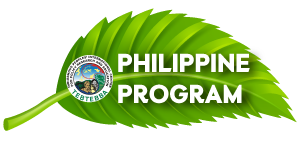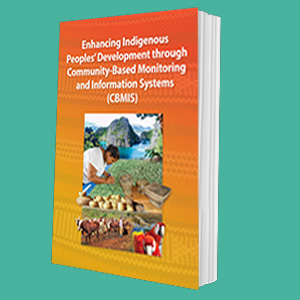Publications
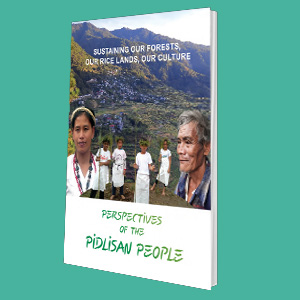
Sustaining our forests, our rice lands, our culture: Perspectives of the Pidlisan People
June 4, 2022
This paper highlights the IKSP associated with irrigated rice farming and actions taken to address various challenges through time. It includes the results of recent innovations undertaken from 2014 to 2020 to revitalize the vibrancy of the rice lands and recommendations for future actions. It also includes notes and documentation by various individuals who were tasked or volunteered to document in the process of community research, meetings, workshops and trainings during the projects.
This paper aims to increase appreciation for the Pidlisan tribe’s indigenous knowledge systems, practices and innovations on rice land ecosystems as habitat and production site; serve as a reference in advancing Indigenous peoples’ education; and contribute to advocacy work for the promotion, revival and strengthening of indigenous knowledge and innovations within the holistic perspective of Indigenous peoples.
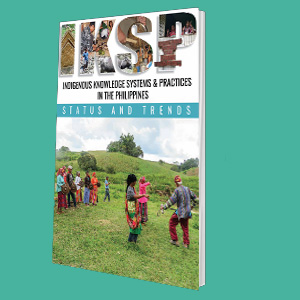
Indigenous Knowledge Systems and Practices in the Philippines: Status and Trends
March 3, 2021
Indigenous peoples (IPs) possess rich indigenous knowledge systems, values, practices, innovations and technologies transmitted through generations since time immemorial. These are the foundations of their persistent pursuit of sustainable self-determined development and of their continuing resilience in the face of climate change and biodiversity loss, discrimination and other numerous struggles. Unfortunately, there is still lack of appreciation on these knowledge systems and practices of indigenous peoples.
As a contribution to increasing awareness and better understanding of the knowledge systems and practices of indigenous peoples in the Philippines, this information material is produced. It highlights the status and trends in the indigenous knowledge systems and practices (IKSP) of the country; the potentials of IKSP in promoting sustainable development; as well as the present threats and challenges to the vitality of IKSP. Moreover, initiatives of various actors including the indigenous peoples themselves, their communities and their organizations for the protection, promotion and further development of their IKSP are presented.

COVID-19 at mga katutubong Mamamayan: Mga Hamon, Epekto at mga Tugon
June 22, 2020
Sa buong mundo, isa ang mga katutubong mamamayan sa mga maaaring pinakamalubhang maapektuhan ng sakit na COVID-19 at ng mga hakbang na ipinatutupad upang masugpo ito. Tinukoy ni dating United Nations Special Rapporteur on the Rights of Indigenous Peoples na si Victoria Tauli-Corpuz, ng mga miyembrong organisasyon ng Elatia (Indigenous Peoples’ Global Partnership on Climate Change, Forests and Sustainable Development), ng UPAKAT (Ugnayang Pambansa Para sa Katutubong Kaalaman at Talino) at ng iba pang mga network organizations ng Tebtebba ang mga maraming salik na nakakaapekto sa kahandaan ng mga katutubo at tugon ng mga ito sa pandemya dulot ng COVID-19.
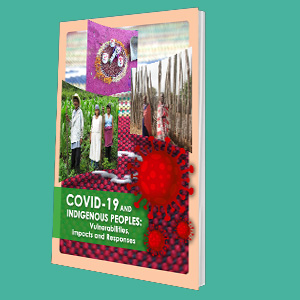
COVID-19 and Indigenous Peoples: Vulnerabilities, Impacts and Responses
June 22, 2022
Globally, Indigenous peoples are among the most vulnerable to both the Coronavirus disease 2019 (COVID-19) and the measures being implemented to curb it. The former United Nations Special Rapporteur on the Rights of Indigenous Peoples, Victoria Tauli-Corpuz, Elatia (Indigenous Peoples’ Global Partnership on Climate Change, Forests and Sustainable Development) and UPAKAT (a national network of indigenous political structures and indigenous peoples organization for the promotion of traditional knowledge and wisdom in the Philippines) partners of Tebtebba point out many factors that make indigenous peoples among the most vulnerable in the pandemic and what responses indigenous peoples are doing.
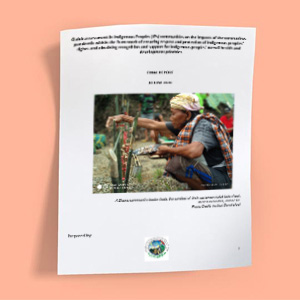
Quick assessment in indigenous peoples (IPs) communities on COVID-19 impacts
Quick assessment in Indigenous Peoples (IPs) communities on the impacts of the coronavirus pandemic within the framework of ensuring respect and protection of indigenous peoples' rights and obtaining recognition and support for indigenous peoples' overall health and development priorities [7196475]
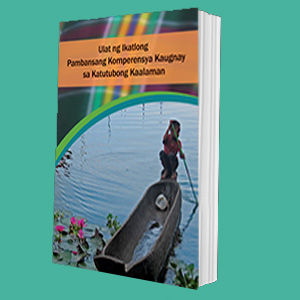
Ulat ng Ikatlong Pambansang Komperensya Kaugnay sa Katutubong Kaalaman
March 21, 2019
Dahil sa mahigpit na relasyon sa kalikasan, ang mga katutubo ay nakapagpaunlad ng mga katutubong kaalaman, teknolohiya at sistema ng pamamahala kung saan ang mga likas yaman lalo na ang mga samu’t saring buhay na kanilang pinagkukunan ng pagkain, gamot at ginagamit sa kanilang kabuhayan ay hindi nawawala, bagkus ay napapayaman pa dahil sa kanilang pagprotekta sa lugar kung saan sila matatagpuan.
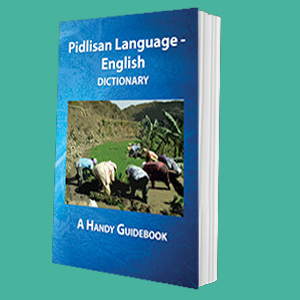
Pidlisan Language-English Dictionary: A Handy Guidebook
February 28, 2017
The survival and development of indigenous languages will require the will and efforts of indigenous peoples as well as the implementation of supportive policy, especially in the field of education...
Adopted by the General Assembly [in 2007], the United Nations Declaration on the Rights of Indigenous Peoples-along with other relevant human rights standards-provides the foundation for developing policies and laws related to the promotion and strengthening of indigenous languages.
- Fact Sheet on Indigenous Languages, UN Permanent Forum on Indigenous Issues, 2008
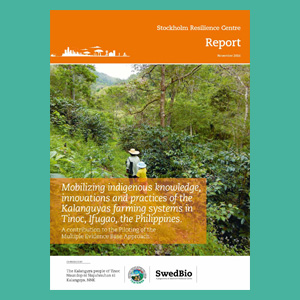
Mobilizing indigenous knowledge, innovations and practices of the Kalanguyas farming systems in Tinoc, Ifugao, the Philippines: A contribution to the Piloting of the Multiple Evidence Base Approach
November 22, 2016
This report presents the outcomes of a collaborative partnership between Tebtebba Foundation, Philippines and SwedBio for piloting a Multiple Evidence Base approach to co-generate knowledge and methods for mutual learning across knowledge systems.
As a response to the exploitation and degradation of their ecosystem, the Kalanguyas have gone through a process of unification over the last decade, contributing to revitalizing their indigenous knowledge and confidence in their culture and local practices. The process empowered them to identify innovations that could strengthen their farming systems, such as the System of Rice Intensification, and Indigenous Microorganisms. Farmers engaging in the pilot project used indigenous methods as well as methods from western science to test these innovations in the inum-an, or rotational farming areas and the payew, the traditional rice terraces, with important results that contribute to the revival of sustainable agricultural practices and increased yields.
